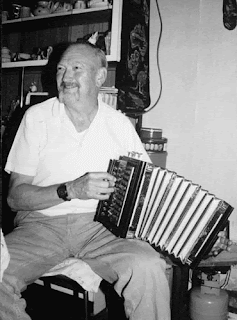 I recently received an e-mail advising me that the National Library of Australia's bookstore is now online. I was on their mailing list having previously bought a quite wonderful CD from them. Hopefully the launch of the online store will enable them to get round some of the rather charming problems I'd had with their manual system - the CD was initially out of stock, and took about a year to arrive, by which time I'd forgotten having ordered it.
I recently received an e-mail advising me that the National Library of Australia's bookstore is now online. I was on their mailing list having previously bought a quite wonderful CD from them. Hopefully the launch of the online store will enable them to get round some of the rather charming problems I'd had with their manual system - the CD was initially out of stock, and took about a year to arrive, by which time I'd forgotten having ordered it.The CD, though, turned out to be a real treat, so I'm pleased to see the store lists it as still being available and in stock. (The Australian Dollar also seems to have strengthened since I bought my copy: the CD costs Aus$19.95 before postage, which today works out at about £14).
Sharing the Harvest is a 2-disc set of John Meredith's field recordings of folk songs and tunes made in the 1950s. There are some pieces generally familiar from Australian, Irish and British traditions (there's a strong selection of Irish/Australian bandit songs), but also some less well-known items.
As ever with field recordings, there are are variations of quality for several reasons. Some are technical, some relate to the age of the performers, some to the recording context, and none makes any difference to the value of the collection. There are some truly exceptional traditional performers represented here, like Sally Sloane. The dropping out of the odd word cannot detract from a performance like Sid Heather's great The Wonderful Crocodile, anymore than the unprompted accompaniment of Ron Manton's dog during what he could recollect of The Banks of the Condamine.
Revisiting the CDs, I'm struck again by Meredith himself. Born in New South Wales in 1920, Meredith had learned the button accordion from his bush worker father, and played for local dances. Moving to Sydney to work for a drug company, he became involved in a folk revivalist movement promoted by the Australian Communist Party. In part they were driven by a cultural nationalism, but this led to a renewed interest in bush songs. Meredith was introduced to a retired shearer, Jack 'Hoopiron' Lee (who can be heard here).
There's an interesting technical aspect to this amateur drive to research. In the 1950s, portable recording equipment was becoming more widely and cheaply available. Meredith, who did not have the technical ability to transcribe a tune, was still able to purchase a tape recorder and go out looking for songs. He was able to record tunes and songs long before he found a scholarly collaborator in Hugh Anderson who could help him prepare them for publication in book form.
Meredith was quite rightly recognised for his fieldwork. The NLA bought his tape collection in 1963, and encouraged further fieldwork to record the oral histories of performers. Meredith resumed fieldwork in the 1980s in collaboration with the Music Department at the University of New South Wales, further adding to the NLA's documentation of vernacular culture.
However, the availability of this technical wherewithal extended well beyond those like Meredith who dedicated themselves to the quest for traditional music. I have heard several stories of people in the 1950s recording domestic parties at which there was singing, in part simply because they now could. These less formal, less directed, recordings may still be lurking in attics and cellars. It's worth keeping an eye open for these things, as they may offer small but valuable contributions to our knowledge of vernacular singing.

No comments:
Post a Comment